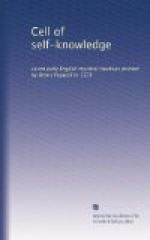The first doctrine of our Lord is this:
“Knowest thou not, daughter, who thou art and who I am? If thou know well these two words, thou art and shalt be blessed. Thou art she that art nought; and I am He that am ought.[118] If thou have the very knowledge of these two things in thy soul, thy ghostly enemy shall never deceive thee, but thou shalt eschew graciously all his malice;[119] and thou shalt never consent to any thing that is against My commandments and precepts, but all grace, all truth, and all charity thou shalt win without any hardness.”
The second doctrine of our Lord is this:
“Think on Me, and I shall think on thee.”
In declaring of which doctrine she was wont to say that:
“A soul which is verily united to God perceiveth not, seeth not, nor loveth not herself, nor none other soul, nor hath no mind of no creature but only on God.”
And these words she expoundeth more expressly, and saith thus:
“Such a soul seeth herself, that she is very nought of herself, and knoweth perfectly that all the goodness, with all the mights of the soul, is her Maker’s. She forsaketh utterly herself and all creatures, and hideth herself fully in her Maker, our Lord Jesu; in so much that she sendeth fully and principally all her ghostly and bodily workings in to Him; in whom she perceiveth that she may find all goodness, and all perfection of blessedness. And, therefore, she shall have no will to go out from such inward knowledge of Him for nothing.[120] And of this unity of love, that is increased every day in such a soul, she is transformed in a manner in to our Lord, that she may neither think, nor understand, nor love, nor have no mind but God, or else in God. For she may not see herself, nor none other creature, but only in God; nor she may not love herself, nor none other, but only in God; nor she may have no mind of herself nor of none other, but only in God, nor she may have no mind but only of her Maker. And therefore,” she said, “we shall have none other business but only to think how we may please Him, unto whom we have committed all our governance both in body and soul.”
The third doctrine of our Lord is this; in obtaining of virtue and ghostly strength:
“Daughter, if thou wilt get unto thee virtue and also ghostly strength,[121] thou must follow Me. Albeit that I might by My godly virtue have overcome all the power of the fiends by many manner ways of overcoming, yet, for to give you ensample by My manhood, I would not overcome him but only by taking of death upon the Cross, that ye might be taught thereby, if ye will overcome your ghostly enemies, for to take the Cross as I did; the which Cross shall be to you a great refreshing in all your temptations, if ye have mind of the pains that I suffered thereon.[122] And certainly the pains of the Cross may well be called refreshing of temptations, for the more pain ye suffer for My love, the more like ye be to Me. And if ye be so like to Me in passion, needs ye must be like to Me in joy.[123] Therefore for My love, daughter, suffer patiently bitter things, and not sweet things; and doubt in no wise, for thou shalt be strong enough for to suffer all things patiently.”




